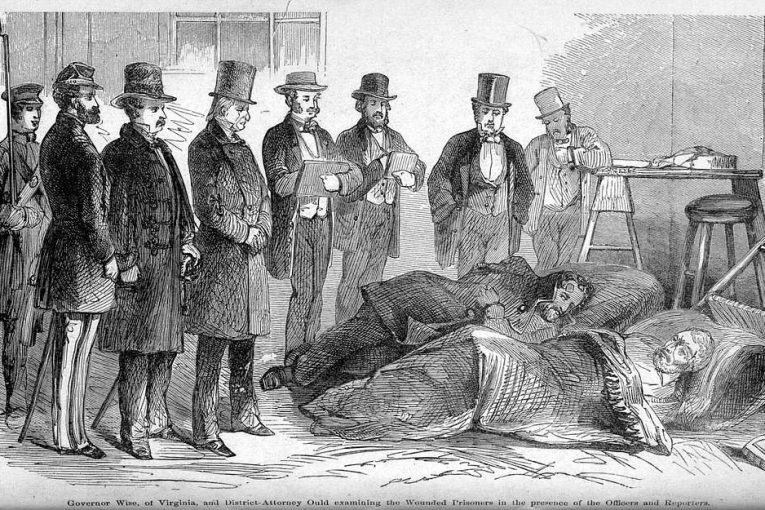

By David M. Greenwald
Executive Editor
I was recently reading Charles Poland’s 2020 book on John Brown and the Harpers Ferry Raid. Brown presents an interesting study because, on the one hand, he directed vicious murders, particularly at Pottawatomie Creek, and on the other hand, he was at least in part attempting to rid America of its original sin—slavery.
As such, Brown was among the most controversial 19th century Americans, viewed “as both a madman and a saintly martyr.”
Poland notes, “The radical and violent abolitionist who was often called America’s first terrorist has had a shift in image, from a fanatical murderer to a benevolent figure whose courageous acts and death inspire admiration and recognition.”
As such, “Modern opinion has more in common with that of the minority view of abolitionist defenders of Brown than with the more prevalent condemnation of the insurrectionist that persisted in the 19th and most of the 20th centuries.”
Poland adds, “He is more viewed as a revolutionary who correctly fought for freedom of the oppressed—a view that understandably resonates with African Americans who award him hero status… the view of Brown being on the correct side of history has been enhanced.”
But perhaps the most interesting point that Poland makes is: “If the Harpers Ferry raid happened today it would be totally unacceptable, legally and in public opinion. Yet today the view of Brown has morphed to that of, at the very least, a “good terrorist.””
That’s perhaps the most interesting point here.
At the time, you could write this off as a fool’s errand. After all, who could possibly believe, even in the 19th century, that a small group of people could pull off what Brown was trying to do. Brown badly and probably naively miscalculated when he believed that slaves would rise up and join their foray into guerrilla warfare.
On the other hand, part of the problem with comparing anything to Harpers Ferry is that there really is no modern day analogue.
The closest I can come is an example from the mid-20th century. Imagine a small band of armed men trying to liberate one of the Nazi death camps. Suicidal for sure, but from the standpoint of public opinion, probably not viewed as totally unacceptable.
I have long believed that most Americans have attempted to completely whitewash the horrors of slavery. The notion that we captured and enslaved tens of millions, abducted them from their native lands to a place where millions perished and millions more lived out their lives in chains, at the whim of the whip.
For a country that prides itself on liberty and freedom, the south reacted with serious violence when their way of life was threatened. Not just in the succession and bloody civil war, but well into the 20th century—black codes, the rise of the KKK and its terror, the horror of lynching, the tyranny of Jim Crow, and periods of bloody and violent reaction to reform.
Today we have turned people like Martin Luther King into heroes and yet, to the day he died, King was one of the most polarizing and in some places reviled figures around. A man who won the Nobel Peace Prize, who adapted Gandhian tactics to modern American Civil Rights—and yet he was met was threats of violence, a multitude of arrests and trumped-up charges, and ultimately a violent end.
It is in this context that the futile yet heroic acts of John Brown take shape as not that of a terrorist but a heroic freedom fighter.
Poland is right of course, these tactics would not be tolerated in our times. We can only look at how contemporaries viewed King and others who were far less set on non-violence. It is only in historical hindsight that we can place these struggles in their proper context.
Is there a contemporary struggle, at least in this country, that is the equivalent of either abolition or the civil rights movement? Probably not. That’s not to downgrade our modern struggles. We have plenty of sins remaining in society for sure.


The 1995 Oklahoma City bombing had a similar insurrectionists’ motivation:
https://apnews.com/article/donald-trump-race-and-ethnicity-oklahoma-city-oklahoma-timothy-mcveigh-2ce923e80b9cae1a0d5896aa7efaac68
Interesting article, but I think the premise of the disconnect is false. Why does he have to be either a hero or a terrorist? Why cant he be both or neither?
For whatever reason, humans strive to put everything into tidy categories. Person A is good, Person B is bad. I have witnessed debates where Someone quotes MLK, only to hve someone else points out his infidelity to his wife, as if the latter sin somehow invalidates the more positive aspects of his legacy… Both can be true.
This is why I love a certain exchange from the movie “pirates of the carribean” where “Bootstrap Bill Turner” is described as “A pirate …AND a good man”.
We can admire Brown’s spirit and passion for the cause of abolitionism WHILE condemning his tactics. We don’t have to pick a side.